
Read Thai 101: Learn Thai consonants
- August 20, 2020
- by Kru Smuk
To start learning Thai script, the first thing you need to learn is “Thai consonants” in which there are in total unique 44 consonants in Thai language.
For some Thai learners, the 44 consonants in Thai language sound like a very big number and quite challenging to overcome. However, in this blog post, I will introduce you to all the essential knowledge including tips and techniques regarding Thai consonants. Let’s begin!
Overview
- 44 Thai consonants
- How to read each consonant name?
- 21 consonant sounds
- 3 classes of Thai consonants
44 Thai consonant
In Thai language, there are in total of 44 Thai consonants. However, there are 2 consonants that are obsolete or no longer used which are ฃ (khoor-khuad) and ฅ (khoor-khon). You cannot even find these two on Thai keyboard.
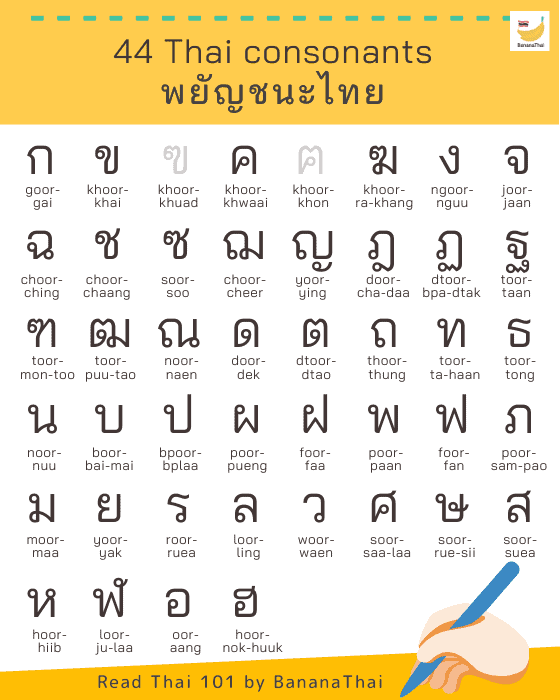
Many of them round have a head. You normally start writing from head to tail. However, there are in total 2 consonants without a head which are ก and ธ (start writing from left to right).
How to call a Thai consonant?
To call each Thai consonant, there are 2 parts in a consonant name:
1. Initial consonant sound + -oor sound
2. Example word that represent the consonant
For example
This ก consonant letter is called goor-gai as the initial consonant is g sound and gai ไก่ means chickening as an example word.
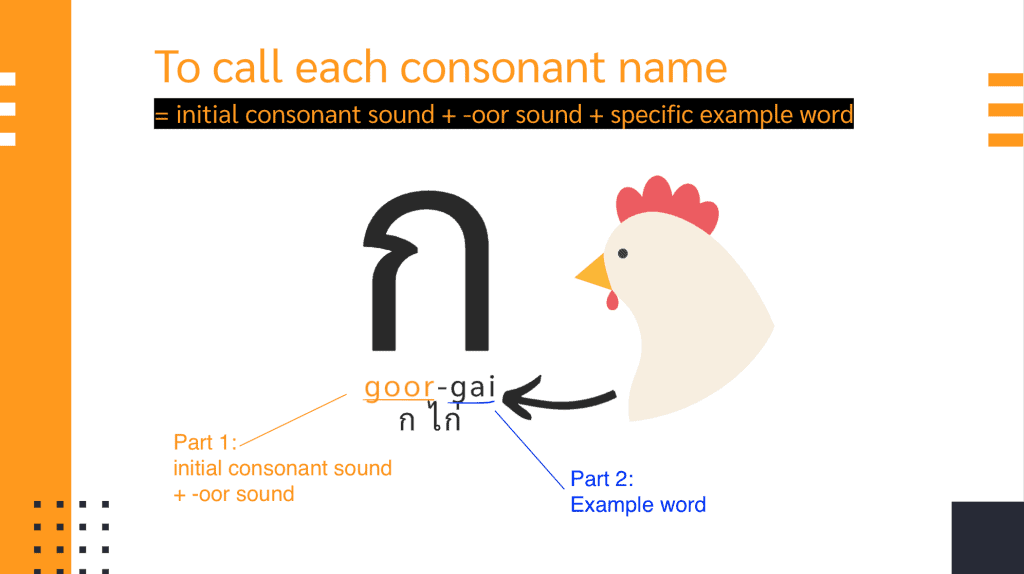
Photo by Ultimate Guide to Thai reading
Common questions regarding how to call a Thai consonant
Question 1:
Is the consonant always -oor sound?
Answer: Yes, always -oor sound!
Question 2:
Can I use other example words instead of “gai” or chicken? Like goor-gin (to eat) instead?
Answer: No, there is only one specific example word of each Thai consonant. We have learned to call consonants in the same way for more than 100 of years.
Question 3:
Can I only call it “goor” without “gai”?
Answer: Yes, you can. However, I would not recommend it as there are some consonants that share the same initial consonant sounds. (I will talk about it in the session below)
21 consonant sounds
Even though there are 44 Thai consonants in Thai alphabet, there are only 21 consonant sounds. It means that some consonants share the same initial consonant sound!
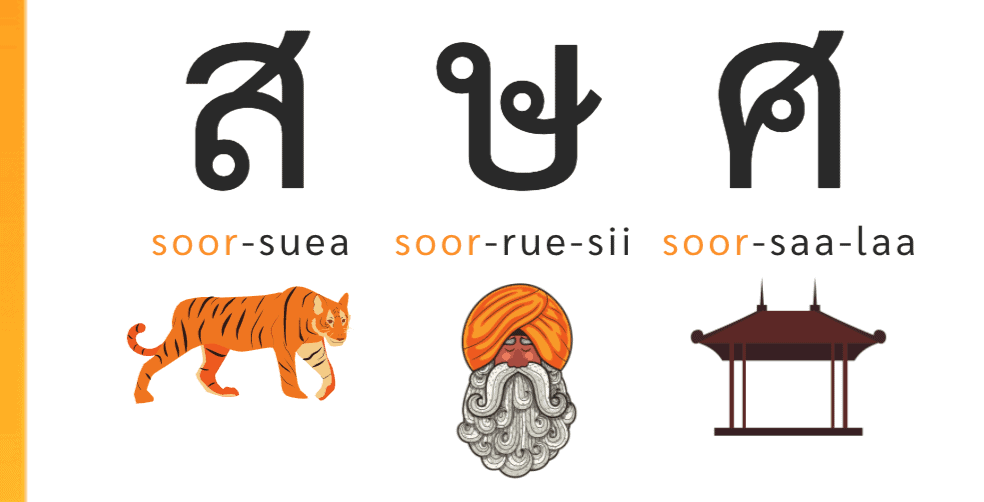 Photo by Ultimate Guide to Thai Reading
Photo by Ultimate Guide to Thai Reading
Per examples in the photo above, the three consonants ส, ษ and ศ share the same -s initial consonant sound. That’s why you need to call the name of each consonant with the specific example word. If you say ‘soor’, it can be ส, ษ and ศ.
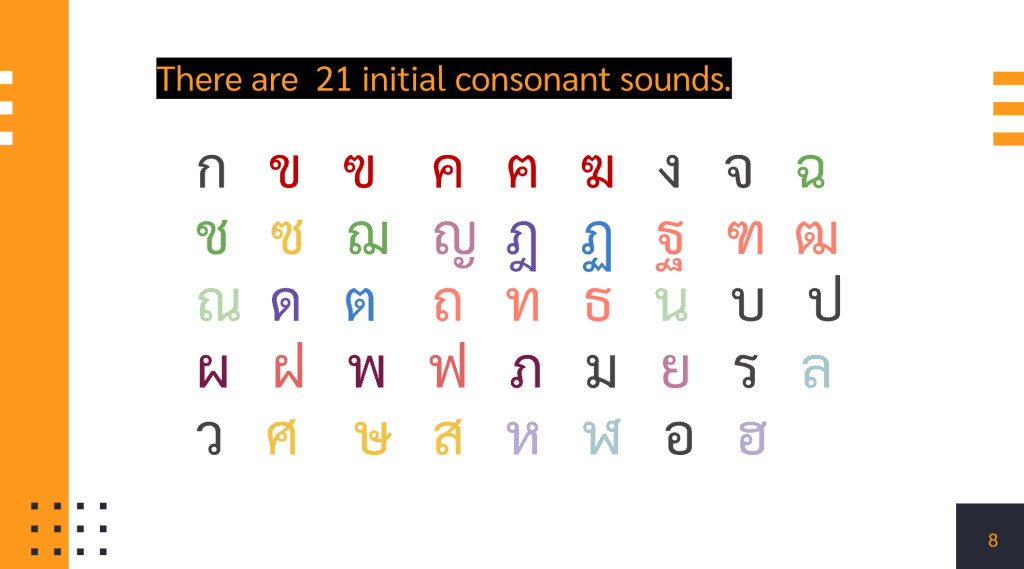 Photo by Ultimate Guide to Thai Reading Course
Photo by Ultimate Guide to Thai Reading Course
As you can see from the photo above, consonants are grouped by initial consonant sounds with a special color. For example:
- Black: Unique sounds
- Red: -k sound
- Dark green: -ch sound
- Light green: -n sound
- Yellow: -s sound
- Pink: -t sound
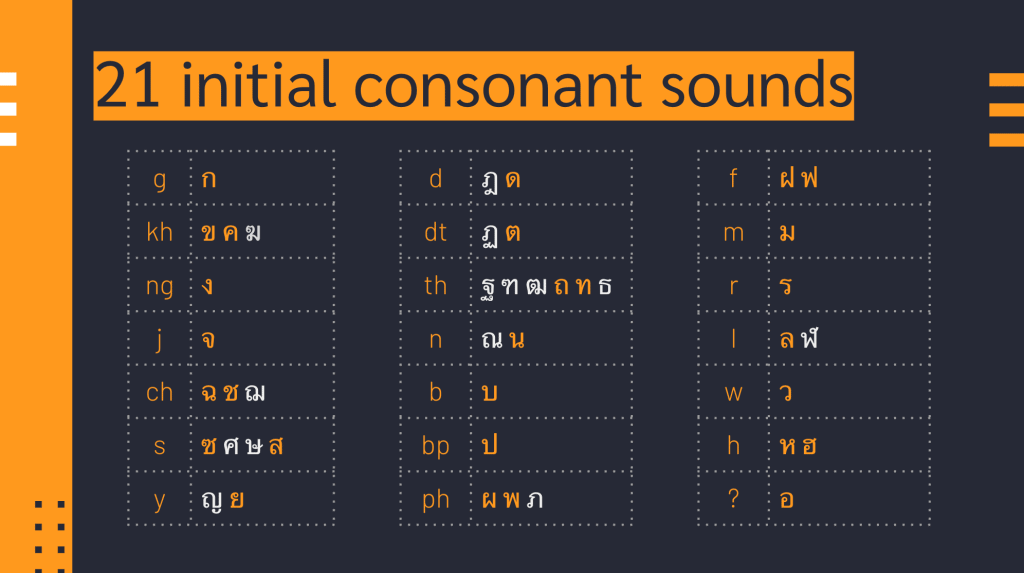 photo by Ultimate Guide to Thai Reading Course
photo by Ultimate Guide to Thai Reading Course
For example
Both ส and ษ have -s initial consonant sound when are with a vowel -า (สระอา -aa sound) then both สา and ษา are pronounced exactly the same as “saa”. It’s because both of them share the same initial consonant sound. However, ส is more commonly used than ษ.
Classes of Thai consonants
One important thing that you have to learn from the beginning is that the 44 Thai consonants are classified into 3 classes which are High Class, Middle Class and Low Class.
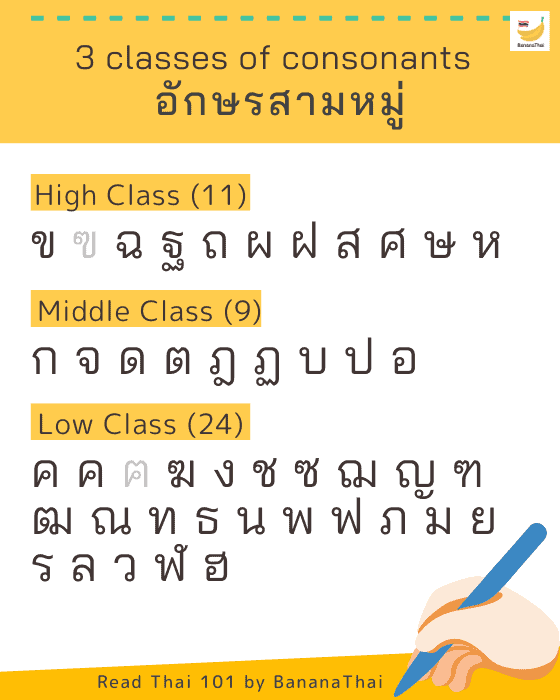
Why?
Since Thai is a tonal language which means words can be pronounced with 5 different tones with totally different meanings. Classes of consonants are one of the things that determine the tones of a word.
Different classes of consonants = different tones = different meanings. That’s why it’s important to learn consonants based on 3 classes of consonants.
Let me show you!
Let’s say ก (goor-gai) is a middle-class consonant while ส (soor-suea) is a high-class consonant.
- กา (gaa) with a flat tone
- สา (sãa) with a rising tone
As you can see, they are in different classes of consonants and have different tone rules. So learning consonants by each class is the easiest way to master Thai consonants.
Summary
That’s it for an overview of basic Thai consonants. I hope I answered the questions you had and made you feel more comfortable with Thai consonants. If you still have any other questions about Thai consonants, please feel free to comment below. I will get back to you shortly.
In the next blog post, I will go deeper into the topic of Thai consonants, as I will be talking about ending consonants because there are only 7 ending consonant sounds in the Thai language. Curious? Just stay tuned!
Learn more
Ending consonant sounds
https://www.bananathaischool.com/blog/blog-ending-consonants/
Start learning your first Thai consonants
 I have uploaded a few lessons from my reading Thai course (Ultimate Guide to Thai Reading) to help you with Thai script on Youtube.
I have uploaded a few lessons from my reading Thai course (Ultimate Guide to Thai Reading) to help you with Thai script on Youtube.
This video below will teach you the Middle-Class consonants and how to write them. Please enjoy!




